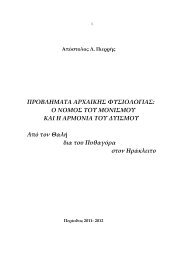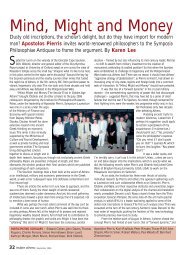chapter 10 the monism of darkness and the dualism of limit and ...
chapter 10 the monism of darkness and the dualism of limit and ...
chapter 10 the monism of darkness and the dualism of limit and ...
Create successful ePaper yourself
Turn your PDF publications into a flip-book with our unique Google optimized e-Paper software.
MONISM OF DARKNESS - DUALISM OF LIMIT AND INDETERMINACY 117<br />
Here moles is <strong>the</strong> firmament <strong>of</strong> <strong>the</strong> heaven <strong>and</strong> solutio is its splitting into<br />
two; in Argonauticon <strong>the</strong> meaning <strong>of</strong> both words is instead required to be<br />
more general. However, <strong>the</strong> word moles can be found in a similar context<br />
to mean <strong>the</strong> firmament, Minucius Felix, Octavius X ad fin.: quasi aut<br />
naturae divinis legibus constitutus aeternus ordo turbetur, aut rupto<br />
elementorum omnium foedere, et coeleste compage divisa (as in Manilius’<br />
Milky Way) moles ista qua continetur et cingitur subruatur. Zeus too may<br />
fit in <strong>the</strong> sought for addition since he is <strong>the</strong> sole <strong>and</strong> greatest cosmic deity<br />
that remains indissoluble during <strong>the</strong> repetition <strong>of</strong> <strong>the</strong> cosmic cycles,<br />
according to <strong>the</strong> Stoic system. But if moles in Valerius Flaccus has <strong>the</strong> same<br />
specific meaning as in Manilius’ passage, <strong>the</strong>n how <strong>and</strong> why can it be<br />
defeated (victa)? (Vossius suggested vinctam, but this is to rewrite <strong>the</strong> text<br />
according to <strong>the</strong> supplementary verse. Fur<strong>the</strong>rmore, <strong>the</strong> attested volvere is<br />
supported by Valerius Flaccus at I, 358: Iuppiter aeternum volvens opus,<br />
<strong>the</strong> Sky.) Victam seems to accord with pondere fessam materiem, <strong>and</strong> to<br />
refer to <strong>the</strong> final victory <strong>of</strong> <strong>the</strong> weight, inertia <strong>and</strong> resistance <strong>of</strong> matter, to<br />
<strong>the</strong> weariness, defeat <strong>and</strong> lack <strong>of</strong> adhesion <strong>of</strong> <strong>the</strong> material. The desired<br />
overall meaning, <strong>the</strong>refore, should presumably be that Hades’ yard (aula<br />
Tartarei patris) at <strong>the</strong> root <strong>of</strong> <strong>the</strong> World (where <strong>the</strong> revolution <strong>of</strong> <strong>the</strong> world<br />
is supported, a rotation by which <strong>the</strong> world’s articulation is held toge<strong>the</strong>r in<br />
its cosmic coherence) will not save <strong>the</strong> World when <strong>the</strong> Pole <strong>of</strong> <strong>the</strong> Universe<br />
crushes down <strong>and</strong> <strong>the</strong> mass <strong>of</strong> matter collapses by reason <strong>of</strong> <strong>the</strong> heaviness <strong>of</strong><br />
its inertia at <strong>the</strong> moment that <strong>the</strong> Order <strong>of</strong> <strong>the</strong> Universe reaches <strong>the</strong> end <strong>of</strong><br />
Time. The passage should <strong>the</strong>refore be filled in somehow as in <strong>the</strong> Aldina<br />
edition:<br />
829 victam si volvere molem<br />
829a .<br />
830 Ingenti iacet ore Chaos; etc.<br />
The World’s basis will not assist <strong>the</strong> crumbling Sky when it realizes <strong>and</strong><br />
suffers <strong>the</strong> revolution around <strong>the</strong> cosmic axis <strong>of</strong> a matter defeated, dead <strong>and</strong><br />
dissolving, when <strong>the</strong> World as a heap falls down <strong>and</strong> collapses, its motion<br />
now becoming more <strong>and</strong> more heavy <strong>and</strong> slow. The Empedoclean<br />
resonances are manifest: so Sphaeros is realised.<br />
54. This is <strong>the</strong> second <strong>of</strong> <strong>the</strong> famous letters that Plinius addressed to Tacitus<br />
where he describes <strong>the</strong> events <strong>of</strong> <strong>the</strong> remarkable eruption <strong>of</strong> Vesuvius in<br />
79A.D. which destroyed Herculaneum <strong>and</strong> Pompei. Here he relates <strong>the</strong>










